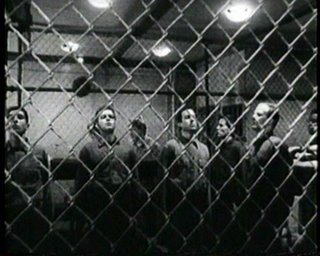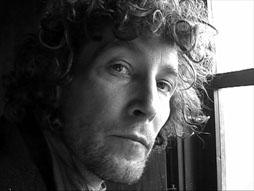The Living Theatre to open a new theatre with an "American" classic

I am not free. There is a structure in my mind that imprisons me. This structure is the world. I obey certain laws. I could be punished. I cannot act upon my sexual desires. I cannot find the resources I need to create my art. I cannot stop war. I cannot live without money.
I said these structures are in my mind. Yet prisons, walls, police, money systems, borders, taboos, are all structures of society. But my mind is, our minds are, society.
Iraq: a ruthless dictator holds the social fabric together. A warring machine, a political fiction, neo-cons, the military industrial complex, call it what you will, invades and does away with the dictator and now there is another structure, equally ruthless that does and does not hold the fabric together.
Thailand: a military coup believes that it is its manifest destiny to bring about democracy.
The United Nations: Bosnia yes; Rwanda no. Sometimes structures act, sometimes not. And today in the Sudan?
How is this decided?
Graffiti on the wall: “Who rules?”
Julian Beck, in 1964 asks: is it easier to observe life in the street or in the theatre?
Sitting in the restaurant I see a petty bust: a white cop handcuffing a young black male. They play their roles perfectly. They are BOTH embarrassed, awkward in their recitations. I am the anonymous public. Impotent. It is cruel.
It is more than a physical tempest, it is a spiritual concussion that is signified in the general trembling of their limbs and their rolling eyes. Artaud
In 1964 The Living Theatre stages The Brig (by Kenneth H. Brown) based on the experience of Marines in the Marine’s brig. Not a play about the Abu Ghraib prison …or Guantànamo but about Marines abusing Marines. The idea was to make the audience feel the cruelty of brute authority and drive home in them the desire to dissolve that same authority.
"Devastating." —Howard Taubman, The New York Times
"Grim, relentless, supercharged." —The New Yorker "
“Unforgettable." —Variety
"A drill, a fist in the guts, a hangover, a nightmare." —The Sunday Telegraph (London)
"Shocking." —New York Post
"An act of conscience, decency, and moral revolt." —The New Republic
"Shattering." — Daily Express (London)
"Blistering, slashing, relentless." —Associated Press
"A nightmare ballet." —Life
"Horrifying, inescapable, and brilliant." —Daily Mail (London)
"An experience that must leave its mark on the American theatre." —Gordon Rogoff, Plays and Players

Calls were made for congressional investigations. The Living Theatre was closed. It was historical. Where is theatre like this today?
"What we learned in The Brig 42 years ago is so much clearer today." Steve Ben Israel, actor who performed The Brig more than 100 times.
Harvey Keitel, when he went to audition for the play, having just left the Marines, said he had had enough of that already.
"Reading the minutiae of description with which Kenneth Brown prefaces his play, I already felt that beauty and that terror in the rigor of the detail." Taken from Directing The Brig (quoted here and below) by Judith Malina, director of The Brig. She tells me it is the best thing she has ever written on theatre. I think she is right.
In the rehearsals Judith applied the rules and regulations of behavior for Marines as prescribed in The Guidebook for Marines, their manual on how to dress, obey, kill, die...and over and over to obey…especially in dying.
Again Steve Ben: "every actor who played The Brig learned it all there in that one play, because that play was for real."

Judith Malina:
My first reading of The Brig was a physical experience of the sense of total restriction. The restriction of the author to the barest facts, like the restrictions on the lives of the prisoners, immediately communicated the immobility of the structure. But what can be done within these strict limits? There is no alternate movement, no choice as to what shall be played upstage or downstage. No clue to the range of possible dramatic action. This is the key. The immobility of the structure.
"Just as we knew where our fellow prisoner was standing and what he was doing without looking at him, so we came to know how he was feeling, if he was in pain, or if he was happy because he was clicked in. It was like telepathy. But it wasn't that. It was community." (Judith quoting an actor describing what came to be known from the actors as The Trip.)
The price of the chaos under which we suffer. The price of the rigid law which gives us a slave's ease. When the audience can know violence in the clear light of the kinship of our physical empathy, it will go out of the theatre and turn such evil into such good as transformed the Furies into the Kindly Ones.
___________________
I don’t know how to get free. I look to the greats to steer me: the Charlie Parker’s, The Janis Joplin’s, the dead and living poets, the eternal rebels. I don’t believe that any social system can ever free me. Perhaps even in an actualized utopist community I might still have to follow rules, limit myself, find a measure of what I can, and cannot get away with. Are we so doomed? I do know that freedom will never be found in The New York Times, on the Internet, by voting, from capitalism, in having things, or even from simple being.
Julian Beck: "No one is free until all of us are free."
For this same reason the Dali Lamas reincarnate in order to be the very last to leave this torture garden. This is the fallacy and limitation of psychoanalysis, of new ageism: those pompous assholes.

And Artaud said that there must still be new experiences, new levels of being yet to discover:
The human face
is an empty power, a
field of death.
... after countless thousands of years
that the human face has spoken
and breathed
one still has the impression
that it hasn't even begun to
say what it is and what it knows.
If in The Brig, in the empty, automaton faces of the prisoners, in the sadistic smiles and violence of the guards, in the complete and horrific silence of the audience, we can examine under the light of art and science this shop of horrors in which we live, if we can risk abandoning our perception of what we believe we are, of what we might become, then perhaps we might take a step together into the real: no fiction.
We need to learn how to feel again.
We are doing The Brig once more. We are risking everything. See you on Clinton Street (New York City) in January.
To read the complete Directing The Brig by Judith Malina go to:
Directing The Brig




